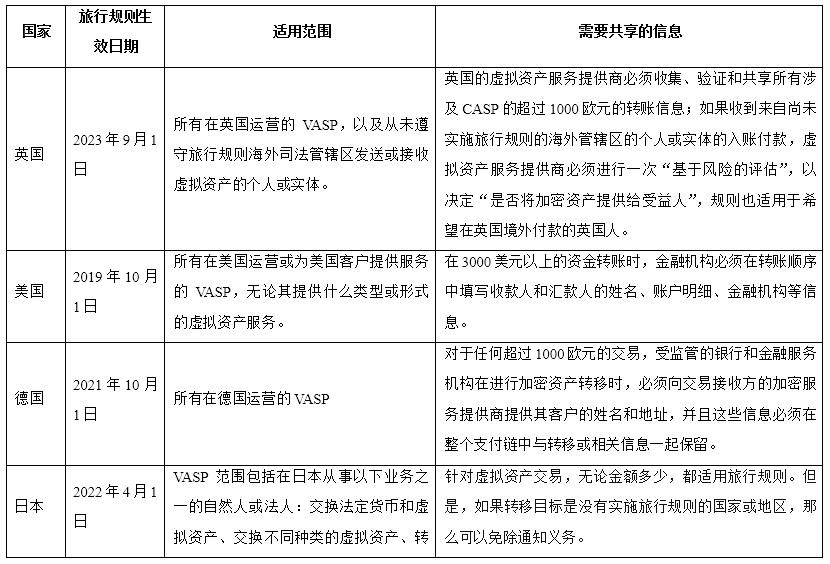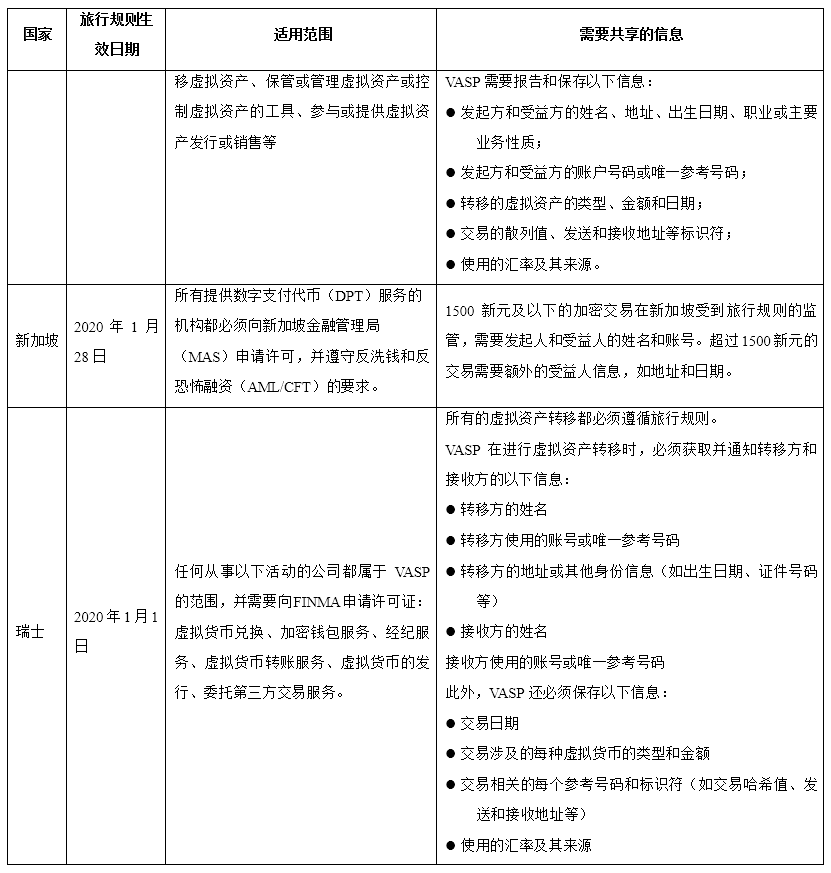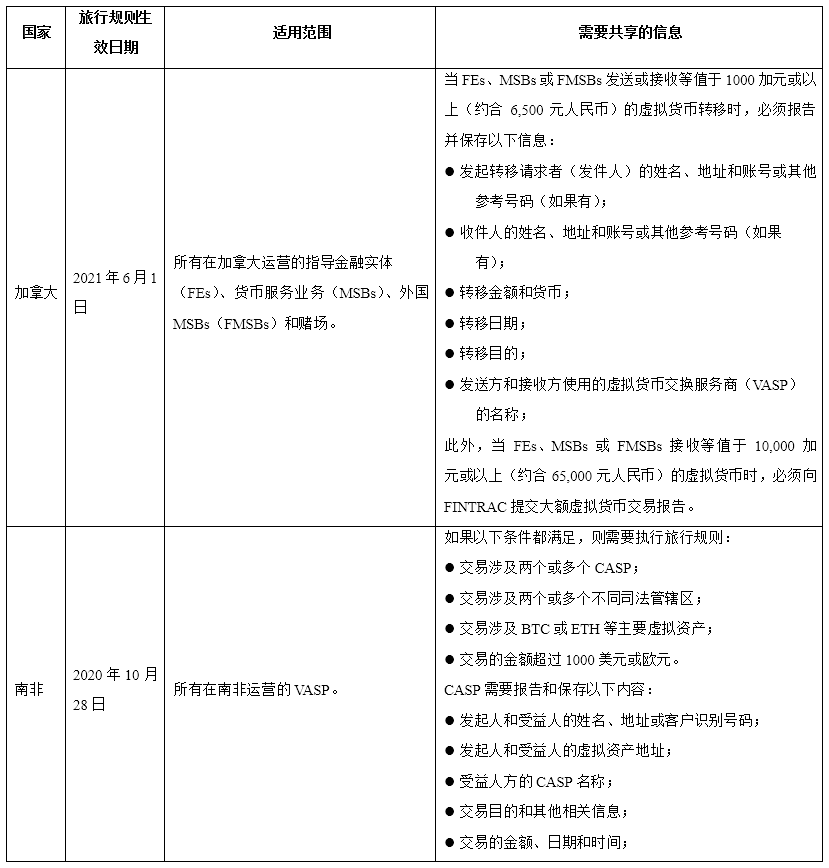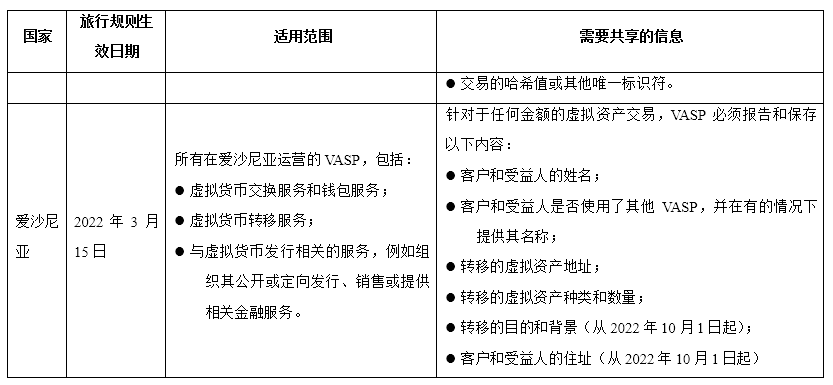Author | TaxDAO
In recent years, the development and popularization of virtual assets have attracted the attention of countries around the world, bringing new challenges and risks to financial regulation and anti-money laundering (AML)/counter-terrorist financing (CFT) efforts. In response, the Financial Action Task Force (FATF) has extended the traditional financial sector's "travel rule" to the virtual asset sector, requiring that when a virtual asset transaction exceeds a certain amount, the identity information of the parties to the transaction must be transmitted along with the transaction, known as the "travel rule."
This article aims to explore the concept of the travel rule and its application in the cryptocurrency industry, analyze the progress, differences, and challenges in the implementation of the travel rule in different regions, evaluate the effectiveness and limitations of the travel rule, and provide corresponding prospects.
1 Concept and Background of the Travel Rule
1.1 Overview of the Travel Rule: From Traditional Finance to Cryptocurrency
In summary, the Travel Rule is an international standard for anti-money laundering and counter-terrorist financing, which requires that when a financial transaction exceeds a certain amount, the identity information of the parties to the transaction must be transmitted along with the transaction (hence "travel") so that regulatory authorities can track and prevent illegal activities.
The Travel Rule was initially proposed by the Financial Action Task Force (FATF) in 1996 for banks and other financial institutions in the traditional financial sector and was revised in 2001 and 2012. With the rise and development of cryptocurrencies, FATF recognized the money laundering and terrorist financing risks in the virtual asset sector and expanded the Travel Rule to Virtual Asset Service Providers (VASPs) in June 2019, which are entities or individuals providing cryptocurrency trading, transfer, custody, and other services.
1.2 How FATF Promotes the Implementation of the Travel Rule for Virtual Assets
FATF is an intergovernmental policy-making body composed of 39 member countries and regions, with the goal of developing and promoting global standards and measures for anti-money laundering, counter-terrorist financing, and the financing of proliferation of weapons of mass destruction. FATF was established in 1989, headquartered in Paris, and is currently the most influential and authoritative international organization for anti-money laundering and counter-terrorist financing.
The 40 Recommendations issued by FATF are internationally recognized standards for anti-money laundering and counter-terrorist financing, covering legal systems, preventive measures, international cooperation, regulatory supervision, and other content. The "travel rule" is the 16th recommendation among the 40 recommendations.
In June 2014, FATF issued the "Virtual Currencies: Key Definitions and Potential AML/CFT Risks," which was the first time FATF defined and analyzed virtual currencies, pointing out the risks of virtual currencies being used for illegal purposes and recommending countries to take appropriate regulatory measures. This indicates that FATF recognized the impact of the development and popularization of cryptocurrencies on the global financial system and cross-border payments.
Subsequently, in June 2015, FATF issued the "Guidance: Risk-Based Approach to Virtual Currencies." This was the first time FATF proposed a regulatory framework for anti-money laundering/counter-terrorist financing activities and service providers related to virtual currencies, indicating that the customer due diligence, record-keeping, reporting, and supervision requirements originally applicable to traditional financial institutions also apply to virtual currency activities and service providers. However, the framework's definition of "virtual currency" was relatively narrow and did not effectively coordinate virtual asset risk regulation.
Finally, in June 2019, FATF issued the "Interpretive Note and Guidance on Virtual Assets and Virtual Asset Service Providers" (hereinafter referred to as the "Guidance"), renaming virtual currencies as virtual assets and including virtual assets and virtual asset service providers (VASPs) within the regulatory scope, indicating the maturation and standardization of FATF's virtual asset regulation. The "Guidance" includes guiding principles for applying the travel rule to the cryptocurrency field. The travel rule requires VASPs to collect and transmit the identity information of the originator and beneficiary when processing cryptocurrency transfers exceeding $1,000 or equivalent, in order to prevent money laundering and terrorist financing activities. In 2021, FATF revised the "Guidance" to better regulate the rapidly developing virtual assets.
1.3 Overall Impact of the Travel Rule on the Cryptocurrency Industry
1.3.1 Reporting Obligations of VASPs
In the revised "Guidance" in 2021, FATF defined VASPs as "business entities that provide one or more of the following services for or on behalf of others," including:
- Exchange or transfer of virtual assets
- Custody and/or management of virtual assets or tools related to virtual assets
- Participation in and provision of financial services related to the issuance and/or sale of virtual assets by issuers
The document also states that VASPs do not include the following types of business entities:
- Entities that only provide technical support or communication services
- Entities that only provide virtual asset wallet software or hardware
- Individuals or legal entities that only use virtual assets for themselves
VASPs that meet the above conditions bear corresponding travel rule obligations, i.e., when processing virtual asset transactions exceeding $1,000 or equivalent, they must collect and transmit the identity information of the originator and beneficiary to prevent money laundering and terrorist financing activities. Specifically, VASPs should collect the following information:
- Name, account, and address of the originator (or nationality, date of birth, ID number, etc.)
- Name and account of the beneficiary
- Transaction amount and type of asset
VASPs should send this information along with the transaction to the next participant or provide it to the relevant authorities upon request. VASPs should also retain this information for at least five years and take appropriate measures based on risk assessment and regulatory requirements.
1.3.2 Overall Impact of Reporting Obligations for VASPs
On the one hand, the travel rule is beneficial for increasing the transparency and trustworthiness of the cryptocurrency industry, preventing virtual assets from being used for money laundering and terrorist financing, and promoting the interconnection between the cryptocurrency industry and the traditional financial system.
On the other hand, the travel rule to some extent diminishes the anonymity of virtual assets. The travel rule requires VASPs to report the identity information of the transaction parties and retain it for at least five years; therefore, the cryptocurrency industry needs to balance the needs and expectations of users for data security and privacy rights.
2 Application of Virtual Asset Travel Rule in Various Countries
2.1 International Regulatory Direction of FATF 40 Recommendations
The FATF 40 recommendations are not legally binding mandatory requirements; they are a policy framework voluntarily complied with by countries and require countries to develop and implement corresponding laws and regulations based on their own legal systems and actual situations. FATF conducts comprehensive assessments of member countries or regions' anti-money laundering and counter-terrorist financing systems and measures at regular intervals to check whether they comply with the FATF 40 recommendations and other relevant standards and publishes assessment reports.
If a member country fails to meet FATF's requirements, it may be listed as a high-risk or non-cooperative country or region. These countries or regions may face sanctions or restrictions from other countries or regions, such as increased due diligence, reduced financial transactions, asset freezes, etc.
2.2 Countries and Regions Implementing the Virtual Asset Travel Rule
This article has compiled the countries and regions that have implemented the virtual asset travel rule as of September 3, 2023, as shown in the table below.




It is worth noting that the European Union's Markets in Crypto-Assets Regulation (MiCA) also provides corresponding guidance on the travel rule. According to MiCA, the travel rule will be extended to all cryptocurrency transactions that meet its definition and exemptions for minimum transaction thresholds and minimum transfer values will be removed. MiCA is expected to come into effect in February 2024, at which time the travel rules of EU member states will be more coordinated and unified.
3 Conclusion and Prospects
3.1 Effectiveness and Limitations of the Travel Rule
The travel rule has a certain effectiveness in the cryptocurrency field, mainly reflected in its promotion of the standardization and professionalization of the cryptocurrency industry, and the enhancement of VASPs' compliance awareness and capabilities. The travel rule provides VASPs with a clear regulatory framework and standards, enabling VASPs to conduct self-regulation and risk control in accordance with unified requirements. This also helps to improve the fairness of competition between VASPs and market order, avoiding regulatory arbitrage or unfair competition.
However, the travel rule also has some limitations in the cryptocurrency field, mainly in the following aspects:
First, it diminishes the anonymity and decentralization features of cryptocurrencies, infringing on users' needs and expectations for data security and privacy rights. The travel rule requires VASPs to report the identity information of transaction parties and retain it for at least five years; therefore, the personal information of cryptocurrency users may be disclosed or abused, leading to violations of their privacy rights. At the same time, the travel rule is contrary to the decentralized spirit of cryptocurrencies, subjecting cryptocurrency transactions to regulation or intervention by centralized institutions, restricting their autonomy and freedom.
Second, it increases the operating costs and compliance risks of VASPs, which may lead to some VASPs exiting the market or entering the underground economy. The travel rule requires VASPs to establish and maintain a complex system for information collection, verification, transmission, and storage, which requires a significant investment of manpower, material resources, and financial resources, increasing the operating costs of VASPs. At the same time, the travel rule also exposes VASPs to higher compliance risks. If VASPs fail to implement the travel rule in a timely or accurate manner, they may face fines or license revocation. This may lead to some VASPs being unable to withstand the pressure brought by the travel rule and exiting the market or entering the underground economy, affecting the development of the cryptocurrency industry.
Furthermore, it is difficult to adapt to the rapid changes and innovations in the cryptocurrency field, such as emerging forms like DeFi, NFTs, which may not fall within the scope of VASPs or be applicable to the travel rule. The cryptocurrency field is an area full of innovation and change, constantly introducing new technologies, products, and services, such as decentralized finance (DeFi), non-fungible tokens (NFTs), stablecoins, etc. These emerging forms may not fall within the scope of VASPs or be applicable to the travel rule because they may not involve centralized service providers or traditional identity information. This presents challenges and difficulties for the enforcement and supervision of the travel rule.
3 Conclusion and Prospects
3.2 Direction for Improving the Travel Rule
First, expand the scope of the travel rule to include more types or forms of cryptocurrency assets or service providers, such as DeFi, NFTs, stablecoins, etc. For example, DeFi has the advantage of providing higher efficiency, transparency, and fairness, but it is difficult to enforce the travel rule because it lacks clear service providers or customer identity information. This article suggests that the inherent information-sharing platform or protocol of DeFi can be used for on-chain verification, allowing DeFi traders to automatically collect, verify, transmit, and store identity information, achieving self-enforcement of the travel rule.
Second, lower the threshold for implementing the travel rule, remove exemptions for minimum transaction amounts or minimum transfer values, and apply the travel rule to all cryptocurrency transactions. This is to address the increasing number and segmentation of cryptocurrency transactions and the regulatory challenges posed by cryptocurrency price fluctuations. This direction aligns with the direction indicated by MiCA.
Finally, establish unified technical standards and solutions, such as using blockchain, distributed ledgers, smart contracts, and other technologies to achieve secure transmission and storage of information. This is to address the technical barriers and security risks of information sharing between VASPs and improve the efficiency and convenience of information sharing, benefiting the operational management of VASPs.
References
[1] FATF. (2019). Guidance for a risk-based approach to virtual assets and virtual asset service providers.
[2] FATF. (2021). Guidance for a risk-based approach to virtual assets and virtual asset service providers (Revised).
[3] UK Government. (2021). The Money Laundering, Terrorist Financing and Transfer of Funds (Information on the Payer) Regulations 2017.
[4] FinCEN. (2019). Application of FinCEN’s regulations to certain business models involving convertible virtual currencies.
[5] BaFin. (2020). Guidance notice on the interpretation of the term “crypto custody business” pursuant to the German Banking Act (Kreditwesengesetz – KWG) and on the authorisation requirement for crypto custody business.
[6] FSA. (2020). Amendments to the Payment Services Act, etc. for strengthening the regulation of cryptoasset-related businesses.
[7] MAS. (2020). Payment Services Act 2019: Guidelines on licensing for payment service providers.
[8] FINMA. (2019). Guidance 02/2019: Payments on the blockchain.
[9] FINTRAC. (2020). What you need to know about virtual currency transactions: Obligations under the Proceeds of Crime (Money Laundering) and Terrorist Financing Act and associated regulations.
[10] FIC. (2020). Guidance Note 7A: The implementation of the travel rule in terms of section 29 of the Financial Intelligence Centre Act, 2001 (Act 38 of 2001) in relation to crypto assets and crypto asset service providers.
[11] FIU Estonia. (2020). Guidelines on anti-money laundering and terrorist financing measures for providers of services related to virtual currencies or issuers of virtual currencies.
[12] European Commission. (2020). Proposal for a regulation of the European Parliament and of the Council on markets in crypto-assets, and amending Directive (EU) 2019/1937.
[13] Gai Ning. (2021). Virtual currency regulation from the perspective of anti-money laundering: International standards and Chinese practices.
免责声明:本文章仅代表作者个人观点,不代表本平台的立场和观点。本文章仅供信息分享,不构成对任何人的任何投资建议。用户与作者之间的任何争议,与本平台无关。如网页中刊载的文章或图片涉及侵权,请提供相关的权利证明和身份证明发送邮件到support@aicoin.com,本平台相关工作人员将会进行核查。




